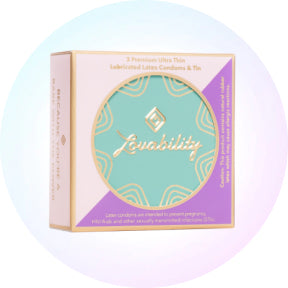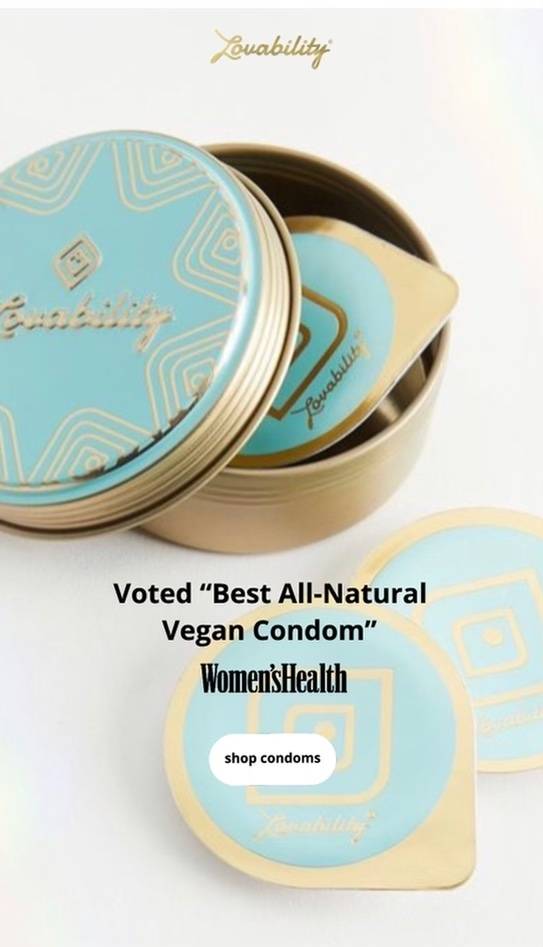In college, sex is well…everywhere.
Whether you're actively exploring pleasures of the bedroom or waiting for the right moment to take the plunge, sex is the not-so-subtle cloud that seems to hang over everything you do (or don't do). And rightfully so. College is your first taste of adulthood, and there isn't a perk quite as alluring as the freedom to sleep with whomever you please.
But the uncomfy reality is that most of us lose our v-card by the age of 17. So the average college student is waltzing onto campus with less than a year of sexual experience and know-how. Since we all agree that the mandatory health class in high school did little beyond showing you how to put a condom on a banana, it's no surprise that many young adults feel just a little bit in the dark when it comes to having safe sex.
College is the time to experiment, make mistakes and learn from them. But with great power comes great responsibility, and in the bedroom, that means prioritizing your safety. Not just protecting yourself and your partner from STIs but also honoring your emotional well-being and comfort levels.
So how can you make sure you're having the safest (and best) sex possible? Let's break it down—starting with the difference between safe sex and safer sex.
What Is Safe Sex?
Beyond avoiding unwanted pregnancy, safe sex is any sexual activity that cannot spread STIs because you're not getting any of your partners' sexual fluids on your mouth or your genitals. While there’s no shame in STIs, learning how to limit exposure creates a healthy sexual experience for all.
Unfortunately, the term "safe sex" has been used to describe activities that do pose some risk, like oral sex or sex with a condom. Those are considered "safer sex" as they reduce the risk of STIs, but they don't eliminate it entirely.
If you want to spend some hot-and-heavy time with a partner without worrying about an infection, try one of these fun little numbers on for size.
Masturbating

Mutual masturbation is so underrated. It is a spicy way to safely explore your sexuality and a game-changer in showing your partner how you like to be touched. Just be sure you wash those hands if you decide to touch each other too.
Dry Humping

Also lovingly referred to as grinding, dry humping (while clothed) lets you enjoy all the juicy magic of being wrapped up in another person without actual penetration. Loose clothes may be easier to move around in—hello nipple play—but there's something to be said about the friction of a good pair of jeans.
Fingering

Welcome to second base. Some below-the-pants action is totally welcome if you're practicing safe sex. And if you've also played with some mutual masturbation, your partner is more likely to skip that whole awkward "how does this feel" phase.
Hand Jobs

If you're workin' with a penis, a good 'ole fashioned hand job is still fair game.Take it slow, spend some time exploring and keep some distance from your mouth to ensure your encounter is truly risk-free.
Phone Sex

Distance makes the heart grow fonder—and hotter. There's no greater turn-on than describing your deepest fantasies to your partner over the phone. Immerse yourself in the build-up and revel in the pleasure of auditory love-making.
Sexting

Sending and receiving spicy pics and videos is super hot. But while this engagement is completely risk-free of STIs, it does pose the risk of your adult content getting into hands you didn’t give consent to.
Before you press send, make sure you 100% trust the person you're sharing this with. And even so, still take some extra security measures by not showing your face and hiding any identifying features like a tattoo.
What Is Safer Sex?
Safe sex gets a bad rap for being juvenile when in reality, it's just as pleasurable and intimate as other sexual acts. But if you want to explore more routes of the flesh—and still minimize your risk of STIs—then you'd be practicing safer sex.
However, this more holistic approach to sexual wellness and safety in the bedroom goes way beyond STI and pregancy protection. Sex requires a lot of vulnerability. Vocalizing your physical as well as emotional desires and needs is essential to creating a sensual experience that will leave you feeling empowered and satisfied.
“Safe sex isn’t limited to STIs and pregnancy,” says Maureen Pollack, sexual health brand Lovability’s resident Pleasure Queen and inventor of The WaterSlyde. “Your safety also includes your emotional and physical well-being.”
Practicing safer sex means you’ll both protect yourself from STIs and unwanted pregnancy using barriers, medication, and frequent testing, AND you’ll self-advocate in the bedroom without fear or shame.
So, in addition to selecting your preferred method of protection, take some extra precautions before your next sexual encounter. Your future, sexy self will thank you.
Sex With A Condom

Let's start with the most obvious method of safer sex: using a condom.
Wearing a latex condom during penetration protects you and your partner from STIs that are spread through bodily fluids like semen and blood. It’s not 100% effective, but it drastically lowers your chances. So babe, if you want to have sex, please don't rely on your partner to have protection. Store one of these cute (and female-friendly) condom tins in your purse so you're always prepared for a good time.
Oral Sex

Not feeling penetration? Oral sex is a deliciously wonderful alternative for both giving (and receiving) pleasure while still reducing your risk for STIs. However, it's only considered "safer sex" if you use a condom or a dental dam. Flavored condoms can be fun for oral sex – just don’t use them for vaginal sex; if that’s part of the playbook, look for a condom made from fresh, natural latex condom that lacks the typical rubbery, chemical taste of regular condoms.
Using Sex Toys

There's a whole, wide, sexy world of gizmos and gadgets out there, and exploring them with a partner is oodles of fun. But because it's all too easy to transfer fluids during this kind of playtime, wash your toys before using them on your partner to reduce your risk of infection. A quick wipe with some eco-friendly and body-safe personal wipes will do the trick. And if you’re doubting the cleanliness or material of a sex toy, try using a condom on it.
Choose A Respectful Partner

No Fuckboys allowed. Period. You don’t need to wait for Prince Charming, but you should take your time finding someone who wants to rip your clothes off respectfully.
That means:
- Saying “no” means no (at whatever stage you’re at) and is never shamed.
- There’s zero pressure to perform or go beyond your comfort zone.
- And they prioritize your pleasure just as much as theirs.
Identify Your Boundaries

I've said it before, and I'll say it again: vocalizing your boundaries is key. Whether you're engaging in safe sex or safer sex, make sure that all parties involved are comfortable with what's happening—every step of the way.
Be upfront about what you will and won’t do and what you like and don’t like. I mean, if you can’t be honest with your partner, how can you expect them to know how to make you feel good?
Pick A Comfortable Location

Wherever you decide to get intimate, make sure it's somewhere you feel at ease. Don’t get dragged into some gross frat house when you’d much rather be snuggled up in your dorm room.
If your partner pushes back or tries to convince you to go somewhere you don’t want to go, just leave. You can send them a thank you card later for not wasting any more of your time.
Make The Right Choice For You
At the end of the day, it's up to you to decide what kind of sex you want to have. There’s no "right" way to do it. Whether you’re dry humping ‘til the cows come home or testing out different flavored condoms with your bae, the most important thing is that you feel comfortable, respected, and safe—all the ingredients necessary for great sex both in college and for the rest of your life.
Still have questions? Speak with someone you trust or a doctor - and don't be afraid to pay a visit to your college's health services building. They can guide you to even more resources and services for your sexual health.
About The Author
Emily Blackwood is a freelance journalist committed to answering the plaguing question of what makes us truly happy. Turns out, it's a lot. Her work has been published in SELF, HuffPost, and YourTango. You can learn more here.
___________________________________________________
Medical Disclaimer: The information provided here is intended for educational and informative purposes only and is not intended to serve as medical or professional advice. If you have any concerns or questions about your health, you should always consult with a physician or other health-care professional.














